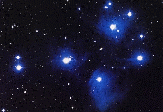
Dafydd's Astronomy Page


|
Dafydd's Astronomy Page |

|
Here are some links to astronomical WWW pages.
 Carlsberg Meridian Telescope
- Probably the best meridian telescope in the world.
Carlsberg Meridian Telescope
- Probably the best meridian telescope in the world.
 Hipparcos
- ESA Astrometric Satellite.
Hipparcos
- ESA Astrometric Satellite.
 GAIA
- The next ESA Astrometric Satellite (Cornerstone 6) - to be launched
no later than 2012.
GAIA
- The next ESA Astrometric Satellite (Cornerstone 6) - to be launched
no later than 2012.
 Cambridge Astronomy Home Page - The general home page for all Cambridge's
astronomical institutions.
Cambridge Astronomy Home Page - The general home page for all Cambridge's
astronomical institutions.
 La Palma - Information about the telescopes on El Roque de los
Muchachos, which includes the ING group
of telescopes. The IAC have a good
weather page
for La Palma.
If you want more detailed weather information for the Observatory then the
NOT
and ING
have the info for you.
La Palma - Information about the telescopes on El Roque de los
Muchachos, which includes the ING group
of telescopes. The IAC have a good
weather page
for La Palma.
If you want more detailed weather information for the Observatory then the
NOT
and ING
have the info for you.
 NASA Astrophysics Data System (ADS) Abstract Service - very useful.
US
link. You may also need the
astro-ph server.
NASA Astrophysics Data System (ADS) Abstract Service - very useful.
US
link. You may also need the
astro-ph server.
 AstroWeb - a collection of pointers to astronomy-related information
available on the Internet.
AstroWeb - a collection of pointers to astronomy-related information
available on the Internet.
 APOD - Astronomy Picture of the Day.
APOD - Astronomy Picture of the Day.
 Astronomer's Bazaar - Catalogues at the CDS.
Astronomer's Bazaar - Catalogues at the CDS.
 SIMBAD - The SIMBAD astronomical database.
SIMBAD - The SIMBAD astronomical database.
 STARLINK - Information on the Starlink Project, the computing
facility for UK astronomers.
STARLINK - Information on the Starlink Project, the computing
facility for UK astronomers.
 The Digitized Sky Survey - Almost faster than going to the plate
library (LEDAS, UK link). The
STScI link (US).
The Digitized Sky Survey - Almost faster than going to the plate
library (LEDAS, UK link). The
STScI link (US).
 Space Telescope - Information about the Hubble Space Telescope.
Space Telescope - Information about the Hubble Space Telescope.
 Exoplanets - List of currently known extrasolar planets.
Exoplanets - List of currently known extrasolar planets.
 Space Calendar - What's about to happen in space soon.
Space Calendar - What's about to happen in space soon.
 Astronomy Now - All the latest from Astronomy Now.
Astronomy Now - All the latest from Astronomy Now.
 Today at NASA - All the latest news from NASA. From here you can get
information on most NASA things.
Today at NASA - All the latest news from NASA. From here you can get
information on most NASA things.
 Solar System - The Solar System Dynamics group at JPL. If you want
some ephemerides click
here.
Solar System - The Solar System Dynamics group at JPL. If you want
some ephemerides click
here.
 IERS - The bulletins of the International Earth Rotation Service.
IERS - The bulletins of the International Earth Rotation Service.
 IAU WWW home page - International Astronomical Union - "You don't get me
I'm part of the union."
IAU WWW home page - International Astronomical Union - "You don't get me
I'm part of the union."
 RAS - Royal Astronomical Society.
RAS - Royal Astronomical Society.
 Astronomy Acknowledgement Index - See how often people acknowledge you.
Astronomy Acknowledgement Index - See how often people acknowledge you.
 SkyView - as the blurb says "SkyView is a Virtual Observatory on the
Net. SkyView generates images of any part of the sky at wavelengths in all
regimes from radio to gamma-ray".
SkyView - as the blurb says "SkyView is a Virtual Observatory on the
Net. SkyView generates images of any part of the sky at wavelengths in all
regimes from radio to gamma-ray".
 Bad Astronomy - how to get things wrong.
Bad Astronomy - how to get things wrong.